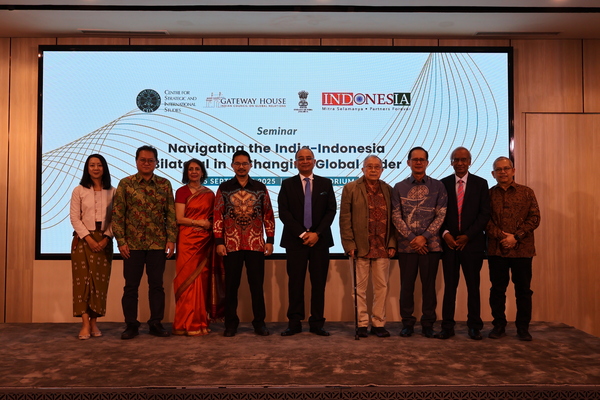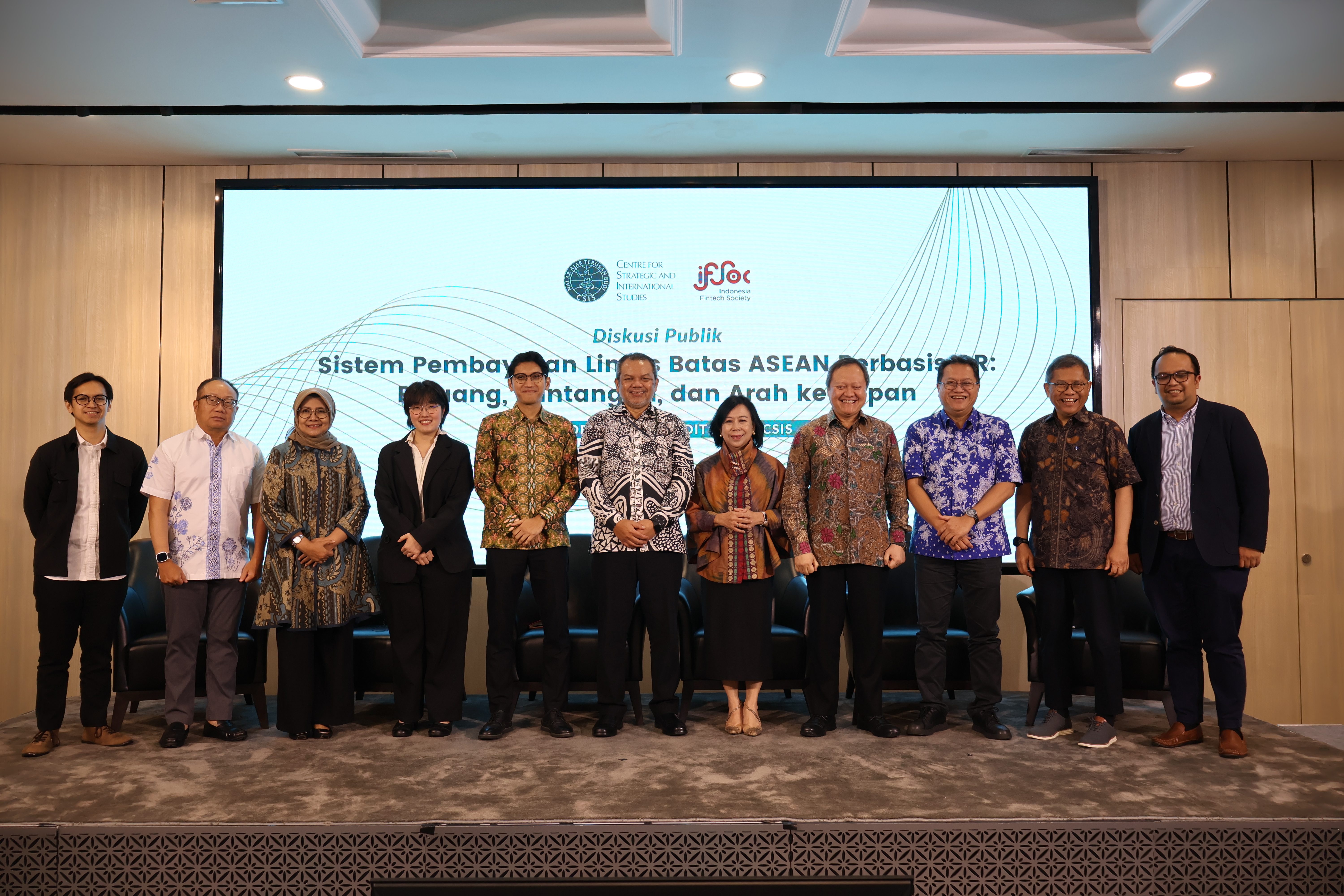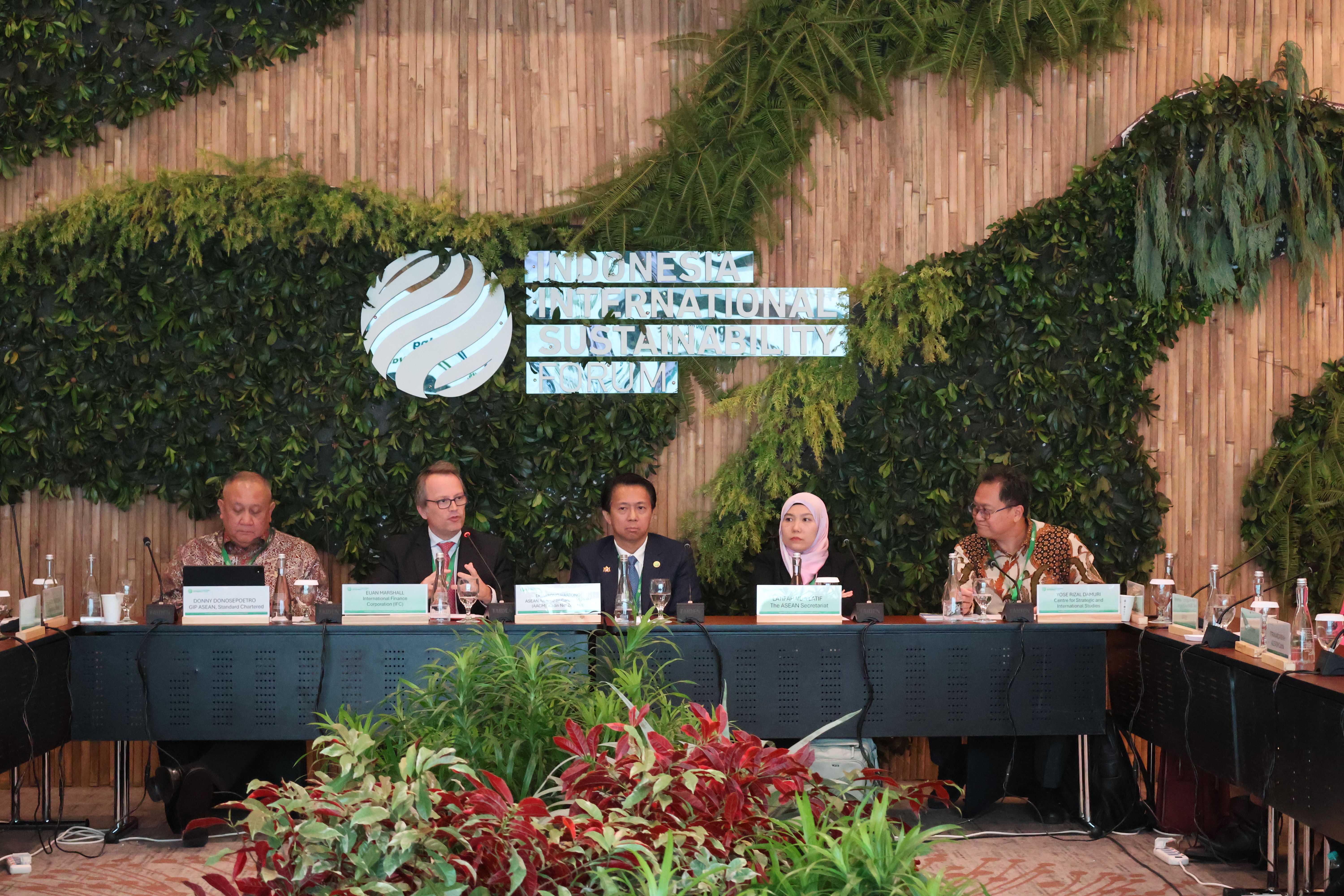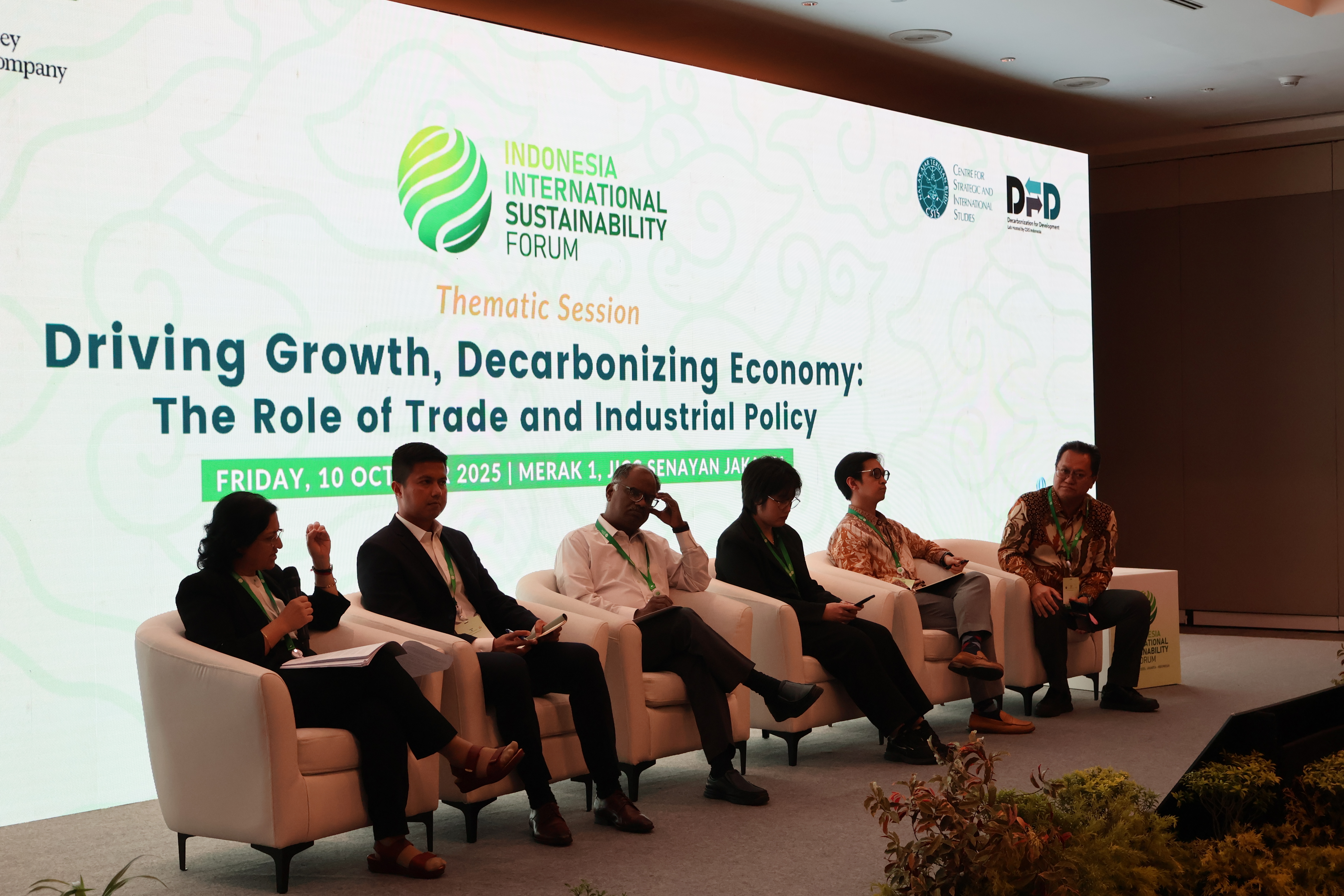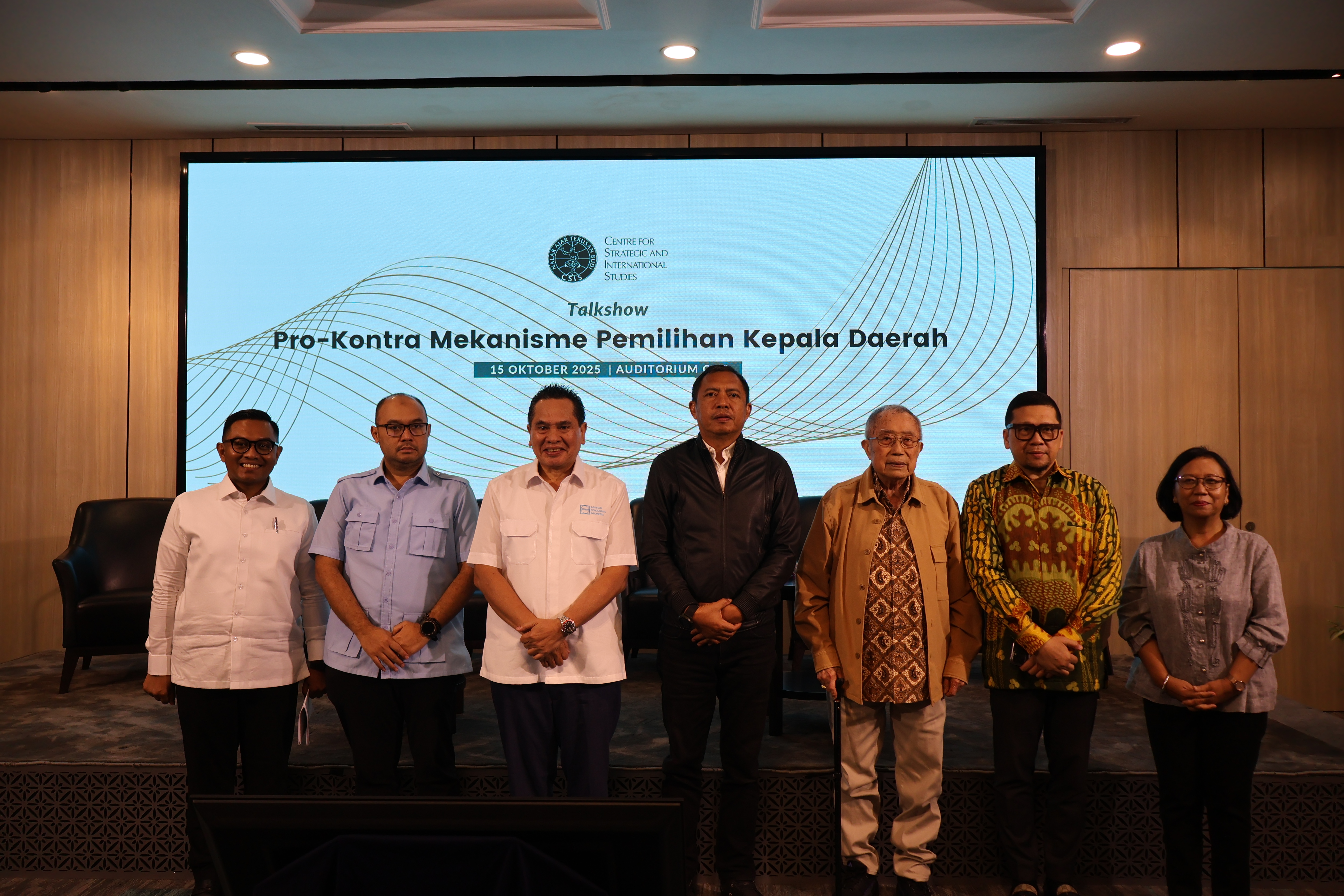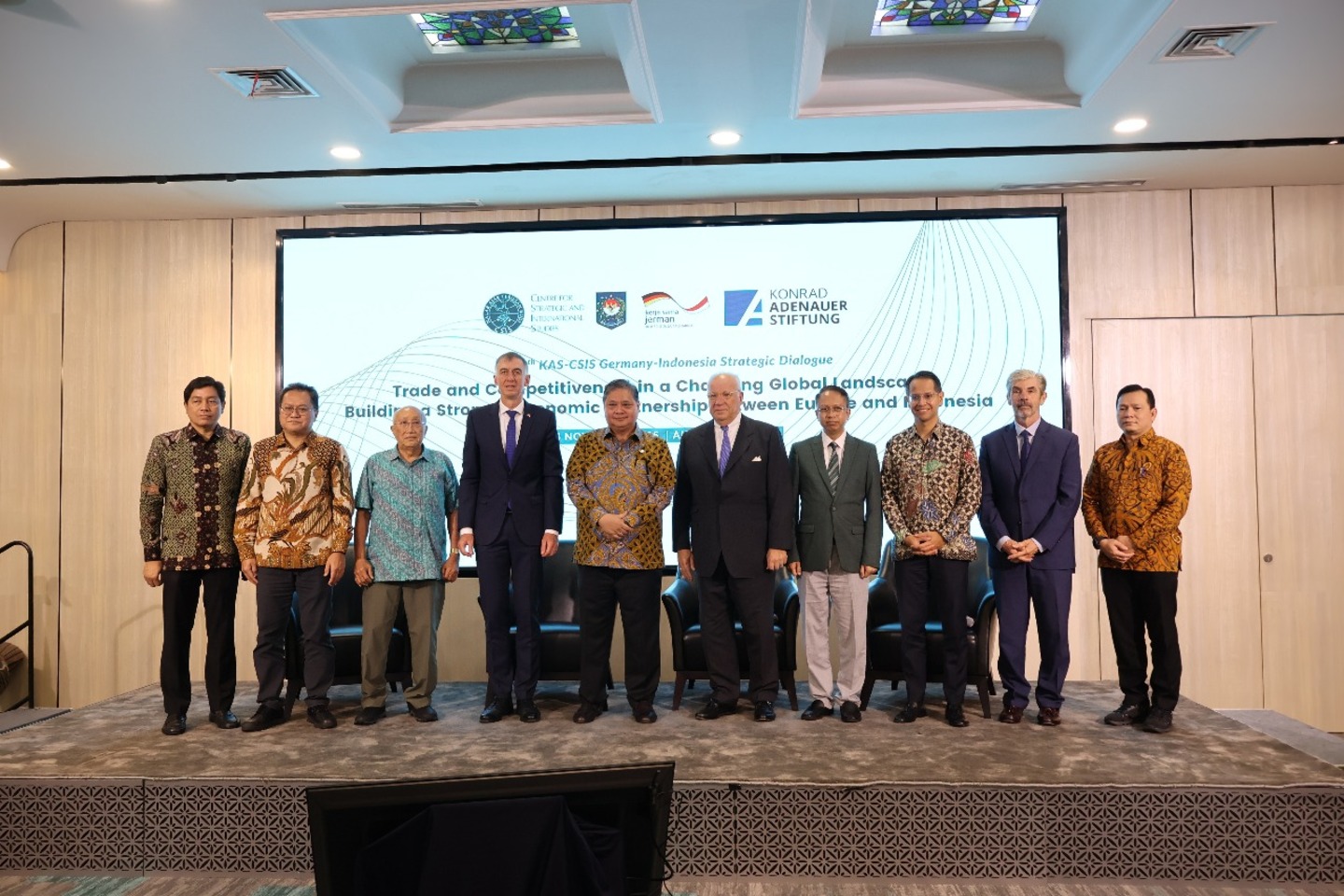
Jakarta, November 4, 2025 – The Centre for Strategic and International Studies (CSIS) Indonesia and the Konrad-Adenauer-Stiftung (KAS) jointly hosted the 9th Germany–Indonesia Strategic Dialogue in Jakarta under the theme “Trade and Competitiveness in a Changing Global Landscape: Building a Stronger Economic Partnership Between Europe and Indonesia” at the CSIS Auditorium.
The strategic dialogue gathered policymakers, diplomats, business leaders, and academics from Indonesia, Germany, and the European Union to discuss the evolving global trade architecture, the recently signed Indonesia–European Union Comprehensive Economic Partnership Agreement (IEU–CEPA), and the future of economic collaboration between the two regions.
Opening Remarks:
Yose Rizal Damuri, Executive Director of CSIS Indonesia, emphasized that CEPA represents “more than just a trade deal, it’s a platform for long-term cooperation and a symbol of confidence.” Amid rising protectionism and economic nationalism, he called for strengthening multilateral frameworks rooted in openness and integration, particularly in emerging sectors such as infrastructure, green energy, and digital transformation.
Echoing this sentiment, Christoph Brand, Board Member and Treasurer of Konrad-Adenauer-Stiftung, highlighted that the Asia-Pacific has become the focal point of global geopolitical developments, urging both sides to have the “courage to deepen cooperation and move forward in uncertain times.”
Meanwhile, Ralf Beste, Ambassador-designate of the Federal Republic of Germany to Indonesia, underscored Indonesia’s growing economic potential, describing it as “not only the largest market in Southeast Asia but also an emerging power.” He encouraged both sides to implement CEPA boldly and continuously, focusing on improving market access, investment climate, and supply chain integration to deliver tangible benefits for both economies.
Keynote Speeches:
Antoine Ripoll, Minister-Counsellor for Parliamentary Affairs at the European Union Delegation to ASEAN, described CEPA as a “game changer” that goes beyond trade to align Indonesia and Europe on geopolitical and geoeconomic priorities, diversify supply chains, and reinforce economic security. He emphasized CEPA’s role in promoting transparency, predictability, and innovation, while calling for a balance between climate protection, digital transformation, and competitiveness. Ripoll urged both sides to elevate their cooperation to a higher level of trust and strategic alignment.
Dyah Roro Esti Widya Putri, Vice Minister of Trade of the Republic of Indonesia, reaffirmed CEPA’s potential as a foundation for deeper and more sustainable economic collaboration. Despite growing global protectionism, she emphasized Indonesia’s commitment to open dialogue and international cooperation. Bilateral trade between Indonesia and the EU reached USD 30.4 billion in 2024, with the EU as Indonesia’s seventh-largest investor at USD 1.1 billion. She highlighted the importance of regulatory alignment, renewable energy, sustainable agriculture, and SME empowerment, noting that harmonized standards can become a competitive advantage attracting high-quality investment and innovation.
Concluding the keynote session, Airlangga Hartarto, Coordinating Minister for Economic Affairs of the Republic of Indonesia, underlined CEPA’s strategic role in supporting Indonesia’s green transition and digital transformation. He noted that the agreement could raise national GDP by 20 basis points and accelerate renewable energy development. The government, he added, is revising regulations and streamlining investment procedures to optimize implementation. Calling for a stronger partnership between Indonesia and Europe, particularly Germany, He concluded with a clear message: “It’s time to act—for the benefit of the Indonesian people.”
Panel Session 1 Toward a New Global Economic Arrangement: The Role of Multilateral and Regional Arrangements
The first panel examined the evolving structure of global trade and the growing importance of multilateral and regional frameworks in navigating economic fragmentation. Speakers discussed how rising protectionism, geopolitical competition, and industrial policy shifts are reshaping the rules of engagement in global commerce, and how Indonesia and Europe can adapt to these changes through cooperation and institutional reform.
Iman Pambagyo, former Director-General of International Trade Negotiations at Indonesia’s Ministry of Trade, set the tone by emphasizing that the multilateral trading system remains the backbone of global trade. He underscored that trade is driven by mutual benefit rather than charity, highlighting Indonesia’s commitment to advancing its development through closer cooperation with trusted partners like Germany and the European Union. He also emphasized the importance of strengthening Indonesia's technological capacity to participate in green and resilient supply chains. From tariff discussions to WTO reform, he reaffirmed becoming more influential in a divided global trade setting.
Dr. Rifan Ardianto, Head of Center for International Trade Policy, Minister of Trade of the Republic of Indonesia, explored how ASEAN’s regional mechanisms can reinforce partnerships with the European Union and ensure inclusivity in global trade. He emphasized that free trade agreements (FTAs) and comprehensive partnerships such as CEPA are crucial for enhancing efficiency, expanding market access, and ensuring resilience amid uncertainty. By integrating rules-based systems and advancing cooperation between ASEAN, RCEP, and the EU, he argued that regional arrangements can create a mutually beneficial and adaptive economic ecosystem that supports both national growth and regional stability.
Christian E. Rieck, Konrad-Adenauer-Stiftung Visiting Fellow, United States Study Centre at University of Sydney and Associate Professor of War Studies at University of Potsdam, provided a European perspective, noting that regional integration remains vital even amid growing securitization of trade. He presented a nuanced view: while bilateralism can fragment economic arrangements, it can also drive deeper cooperation if supported by strong political leadership. He underscored that Europe’s role as a proponent of multilateralism remains indispensable and that strengthening cooperation within the EU and with ASEAN partners can prevent further fragmentation. Ultimately, he concluded, multilateral and regional arrangements are complementary instruments in sustaining global economic order and shared prosperity.
Panel Session 2 Trump’s Trade Legacy in Southeast Asia: Strategic Risks and Openings for Europe
The second session looked at howon how the U.S. President Donald Trump’s trade policies continue to shape global supply chains, creating a mix of risks and opportunities for Southeast Asia and Europe. Speakers discussed how renewed tariff measures, shifting supply chain strategies, and the weakening of multilateral institutions are transforming global trade and driving new forms of regional collaboration.
Jayant Menon, Senior Fellow at the ISEAS–Yusof Ishak Institute, outlined four strategic options available to ASEAN exporters, including Indonesia, in responding to renewed U.S. tariffs: passing through tariff costs to consumers, absorbing them temporarily, reconfiguring supply chains, or diversifying export markets. He observed that while tariffs raise prices in the U.S., they also risk reducing ASEAN’s competitiveness. However, this challenge could spur deeper cooperation among RCEP, CPTPP, and the EU, which together represent nearly two-thirds of global GDP. Menon also emphasized that the U.S. retreat from multilateralism has opened space for alternative arrangements, such as the Multi-Party Interim Appeal Arbitration (MPIA) mechanism, which already covers 60% of global trade. These developments, he argued, show that global trade governance can adapt, with or without the United States, through new coalitions committed to open and rules-based trade.
Tim Wenniges, Deputy CEO of Unternehmer Baden-Württemberg e.V., Stuttgart, brought a European industry perspective, highlighting the trade-off between efficiency and resilience that economies must manage amid geopolitical uncertainty. Representing Baden-Württemberg—the industrial heart of Europe—he explained that the U.S.–China trade rivalry has disrupted supply chains and intensified Europe’s need for diversification. Restrictions on rare earth imports and intermediate goods, he noted, have prompted the EU to design a new industrial policy aimed at strategic autonomy. He cautioned that a potential “G2” alignment between the U.S. and China would marginalize other economies, making it crucial for the EU to strengthen its partnerships with Southeast Asia. Deepening trade and investment ties with Indonesia, he concluded, can help Europe diversify supply chains, secure critical materials, and maintain competitiveness in a rapidly changing global landscape.
Panel Session 3 Beyond the CEPA: Powering the Future of EU-Indonesia Ties through Infrastructure, Energy, and Technology
The third session examined how the Indonesia–EU Comprehensive Economic Partnership Agreement (IEU–CEPA) could redefine bilateral cooperation across infrastructure, energy, and technology, while positioning both partners for a more sustainable and resilient economic future.
Michelle Luminta, Director of Center for International Trade and Investment at Universitas Pelita Harapan, discussed the strategic role of the IEU–CEPA in addressing past trade frictions while paving the way for deeper collaboration in critical sectors. She highlighted that Chapter 14 of the agreement focuses on cooperation in raw materials, notably nickel, and renewable energy from palm oil. CEPA, she noted, provides a framework for investment, technology transfer, and certification standards, while resolving longstanding disputes over raw materials and palm oil trade. By introducing clearer sustainability standards and certification systems, CEPA supports Indonesia’s industrialization agenda and ensures Europe’s access to resilient and sustainable supply chains for critical materials.
Dandy Rafitrandi, Researcher Department of Economics at CSIS Indonesia, emphasized CEPA’s potential to elevate Indonesia’s position in sustainable global value chains, particularly in the food and agricultural sectors. He argued that CEPA can strengthen deforestation-free certification schemes, advance carbon market mechanisms, and reduce barriers to climate-related technologies. Beyond sustainability, CEPA is expected to expand European investment in services, promote digital trade cooperation, and foster regulatory alignment in the digital economy. He underscored that CEPA must deliver mutual benefits—creating quality jobs for Indonesia’s middle class while supporting the EU’s climate and energy transition goals. Both parties, he added, must focus on addressing non-tariff barriers and empowering the private sector to fully utilize CEPA’s potential.
Zsuzsa Anna Ferenczy, Visiting Fellow at Martens Centre and Adjunct Assistant Professor at NDHU Hualien, placed these discussions in a broader geopolitical context through the lens of the EU’s Global Gateway initiative. She noted that Southeast Asian countries such as Malaysia, Indonesia, and the Philippines prefer strategic flexibility rather than choosing sides in global connectivity agendas. Ferenczy cautioned that the EU often approaches the initiative through a geostrategic, China-focused lens, which risks undermining its developmental potential. Instead of competing with China, the EU should aim for complementary and inclusive engagement. She concluded that to gain traction on the ground, Global Gateway must enhance transparency, communication, and inclusivity, ensuring its projects align with local priorities and shared prosperity.
Panel Session 4 Gateway of Bottleneck? Positioning Indonesia at the Heart of Europe’s Integration to Asia’s Supply Chain
The fourth session explored Indonesia’s prospects of becoming a key hub in Europe’s growing integration with Asia’s supply chains, particularly under the evolving framework of the Indonesia–EU Comprehensive Economic Partnership Agreement (IEU–CEPA). Discussions centered on the country’s strategic advantages, structural challenges, and the role of digital transformation and regulatory reforms in strengthening industrial competitiveness.
Didit Ratam, Deputy of International Relations at APINDO, emphasized that while the IEU–CEPA offers major opportunities, it is not a panacea for Indonesia’s trade and competitiveness challenges. Despite its strong fundamentals—geographical centrality, regional trade access, a large economy, and a young workforce—Indonesia’s exports remain relatively stagnant compared to other ASEAN countries. He argued that to truly serve as Europe’s regional hub, Indonesia must close its infrastructure gap, reduce logistics costs, and ensure policy predictability, especially in areas such as import regulations and raw material exports. Relaxing restrictive import policies and improving infrastructure efficiency would enable Indonesia to lower economic costs and attract more sustainable investment flows.
Mugi Harfianza, Head of Digital Industry at PT. Siemens Indonesia highlighted the transformative role of digitalization in enhancing Indonesia’s industrial competitiveness and sustainability. Drawing from Siemens Indonesia’s experience, he explained how digital twins and additive manufacturing can cut material use by up to 50%, while automated building management and smart mobility solutions can dramatically reduce energy consumption and carbon emissions. He emphasized that 90% of Siemens’ global business portfolio contributes to sustainability outcomes, showing how digital innovation aligns with broader environmental goals. For Indonesia, integrating digital industry solutions under the CEPA framework can accelerate modernization, resource efficiency, and the transition to a low-carbon, technology-driven economy.
Jonas Präfke, First Secretary (Economic Affairs) at the German Embassy, reiterated Germany’s support for CEPA as a catalyst for investment predictability and dialogue-based reform. He acknowledged Indonesia’s determination to build its domestic capabilities and attract strategic investment but cautioned that CEPA is not an automatic solution. Rather, it provides a dynamic platform for regulatory convergence, investment dialogue, and long-term cooperation. He stressed that both sides must focus on the practical implementation of CEPA—such as harmonizing halal certification, addressing non-tariff barriers, and ensuring policy consistency—to fully realize its potential. The real challenge, he concluded, lies not in signing agreements but in utilizing them effectively to foster shared growth and sustainable integration between Indonesia and the EU.

